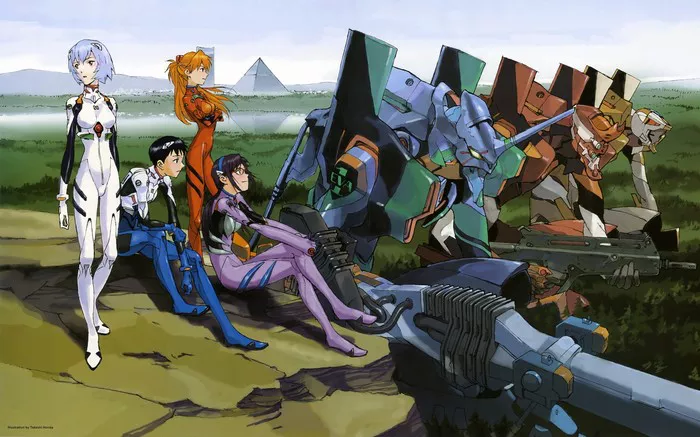Neon Genesis Evangelion is a seminal anime series that has captivated audiences since its debut in 1995. Renowned for its complex narrative, psychological depth, and stunning visuals, Evangelion remains a cornerstone of the anime genre. However, for newcomers to the series, the question of how to watch Neon Genesis Evangelion can be daunting due to its various iterations, movies, and supplemental materials. In this comprehensive guide, we will unravel the enigma surrounding Evangelion and provide a roadmap for experiencing this iconic series in its entirety.
Understanding the Evangelion Universe: A Primer
Exploring the World of Evangelion
Before delving into the viewing order of Neon Genesis Evangelion, it is essential to understand the universe in which the series is set. Evangelion takes place in a dystopian future where humanity is under threat from enigmatic beings known as Angels. To combat this existential threat, the organization NERV develops giant bio-mechanical robots called Evangelions, piloted by a select group of teenagers. As the series unfolds, themes of identity, trauma, and the nature of existence come to the forefront, weaving a complex tapestry of psychological intrigue and philosophical introspection.
Understanding the Different Iterations
Neon Genesis Evangelion has undergone several iterations and adaptations since its original release, leading to confusion among fans regarding the proper viewing order. The primary iterations include the original TV series, the End of Evangelion film, the Rebuild of Evangelion film series, and various supplemental materials such as manga spin-offs and video games. Each iteration offers a unique perspective on the Evangelion universe, exploring different facets of the story and characters.
Deciphering the Viewing Order: Unraveling the Chronological Puzzle
The Original TV Series: Neon Genesis Evangelion (1995-1996)
The original Neon Genesis Evangelion TV series consists of 26 episodes and serves as the foundation of the Evangelion franchise. Directed by Hideaki Anno, the series follows the journey of Shinji Ikari, a reluctant pilot of the Evangelion Unit-01, as he grapples with his inner demons and confronts the existential threats facing humanity. To experience the series in its original form, viewers should start with episode 1 and watch through to episode 26, including the two-part finale.
The End of Evangelion (1997)
Following the conclusion of the original TV series, the End of Evangelion serves as an alternate ending and supplement to the final two episodes. Directed by Hideaki Anno, the film provides a more conclusive and visually stunning conclusion to the series, addressing many of the unresolved plot threads and existential themes present in the TV finale. Viewers should watch The End of Evangelion immediately after completing the original series for a comprehensive understanding of the story’s conclusion.
Rebuild of Evangelion Film Series (2007-present)
In addition to the original TV series and film, the Rebuild of Evangelion film series offers a modern reimagining of the Evangelion story with updated animation and narrative elements. The Rebuild series consists of four films: Evangelion: 1.0 You Are (Not) Alone, Evangelion: 2.0 You Can (Not) Advance, Evangelion: 3.0 You Can (Not) Redo, and Evangelion: 3.0+1.0 Thrice Upon a Time. While the Rebuild films deviate from the original series in certain aspects, they provide an alternative interpretation of the Evangelion story and are worth exploring for fans looking for a fresh perspective.
Unlocking the Mysteries: Exploring Supplemental Materials
Additional Viewing Options
In addition to the core iterations of Neon Genesis Evangelion, fans may also explore various supplemental materials to deepen their understanding of the series and its characters. These materials include manga adaptations, light novels, audio dramas, and video games, each offering unique insights into the Evangelion universe. While not essential to understanding the main narrative, supplemental materials can enrich the viewing experience for dedicated fans seeking to delve deeper into the lore of Evangelion.
The Rebuild vs. the Original Series
One of the ongoing debates among Evangelion fans is whether to prioritize the original TV series or the Rebuild films when experiencing the franchise for the first time. While both iterations offer distinct interpretations of the Evangelion story, each with its own merits and drawbacks, there is no definitive answer to which version is superior. Some fans prefer the original TV series for its depth and complexity, while others favor the Rebuild films for their updated animation and streamlined storytelling. Ultimately, the choice between the two depends on individual preferences and viewing preferences.
Conclusion: Embracing the Evangelion Experience
In conclusion, navigating the Neon Genesis Evangelion franchise can be a daunting task due to its multiple iterations and complex narrative structure. However, by following this guide and understanding the chronological order of the core iterations – starting with the original TV series, followed by The End of Evangelion and the Rebuild films – viewers can experience the full breadth and depth of the Evangelion universe. Whether exploring the psychological depths of Shinji Ikari’s journey or pondering the existential questions posed by the series, Neon Genesis Evangelion continues to captivate audiences with its timeless themes and stunning visuals. So, grab your entry plug and prepare to embark on a journey into the heart of the Evangelion experience.

